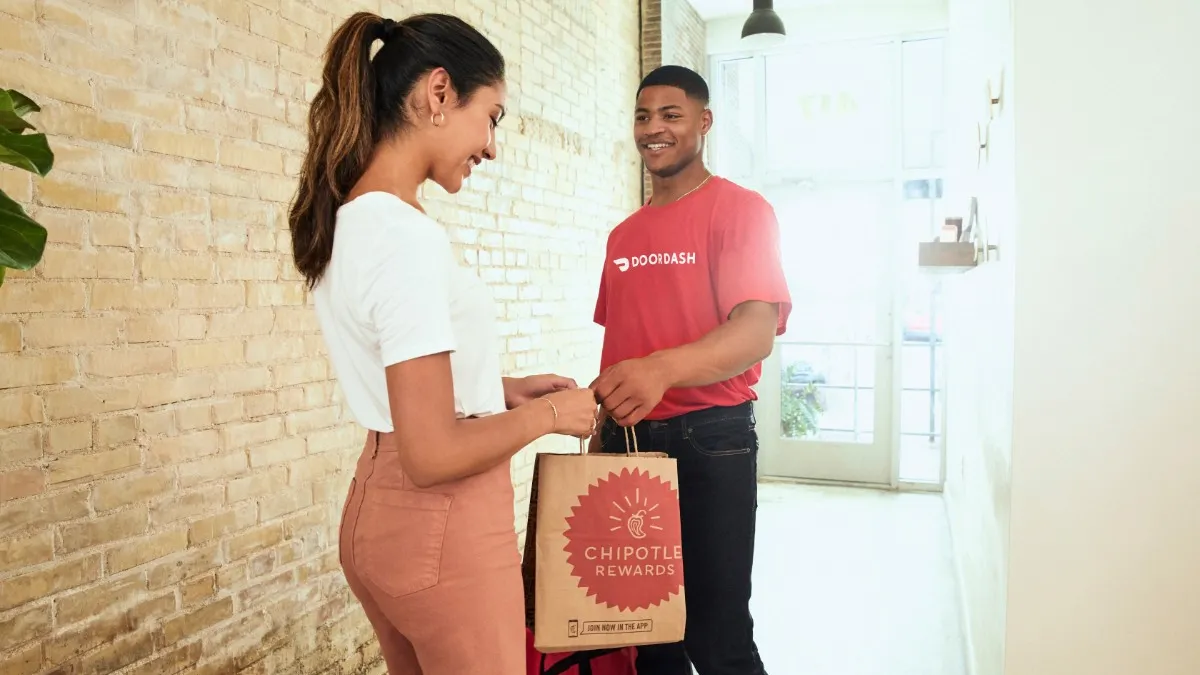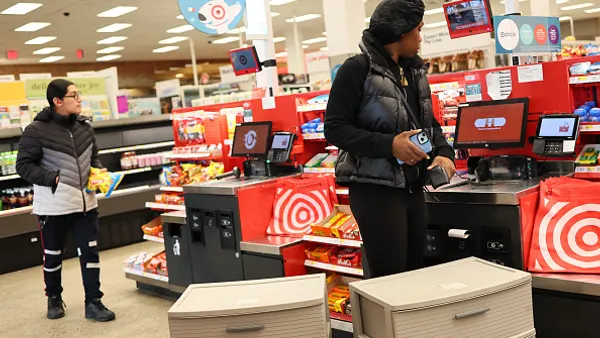UPDATE: Jan. 20, 2021: Postmates is the latest third-party delivery firm to charge a fee to cover costs associated with Proposition 22, a measure that keeps gig workers categorized as independent contractors. Postmates' fees range from 50 cents to $2.50 throughout California depending on market, according to the San Francisco Chronicle. These fees come about a month after parent company Uber added Proposition 22-related charges to its Eats platform. Instacart is the only company that backed Proposition 22 that has not increased its prices, according to the Chronicle.
Dive Brief:
- Uber raised prices for California customers on Monday to add driver healthcare subsidies and other driver perks it promised as part of Proposition 22, a winning ballot measure that exempts third-party delivery platforms from reclassifying drivers as employees. DoorDash will make "slight percentage increases" starting Wednesday to service fees on diner orders, Bloomberg reports. Instacart has not raised prices.
- Uber customers will be impacted differently across cities and based on the type of service they engage with. For example, food delivery bills in Los Angeles increased by 99 cents each, and by $2 in San Francisco, according to Bloomberg.
- Uber, DoorDash, Postmates, Instacart and Lyft contributed about $200 million to support Proposition 22, a measure that Lyft and Uber executives could serve as an example of how to approach other gig economy labor challenges across the country.
Dive Insight:
Though major food delivery providers will pass on new fees to their customers as a result of their Proposition 22 victory, according to these companies, the costs are less dramatic compared to what would have occurred under AB-5, the California gig economy law that requires employers to reclassify independent contractors as employees. Uber CEO Dara Khosrowshahi said during a Wall Street Journal interview if Proposition 22 didn't pass, prices for consumers would have gone up anywhere from 25% to 100% depending on location.
Beyond healthcare subsidies for drivers who work at least 15 hours per week, the limited benefits under Proposition 22 include mileage reimbursement, occupational insurance, minimum earnings while completing a ride or a delivery, according to Bloomberg.
DoorDash told Business Insider that in addition to higher service fees, it may also tweak promotions like DashPass, which could lead to steeper costs as well. Though increases of just a dollar or two are minimal compared to Khosrowshahi's predictions of a 100% increase under AB-5, diners could still balk at these larger delivery fees. In the age of convenience, where demand for speedy and frictionless food ordering experiences has been exacerbated by the pandemic, diners are also growing accustomed to food channels that offer stronger value, such as drive-thru and curbside pickup.
Sixty-two percent of diners report they are willing to pick up their food order from convenient locations, for example, according to Deloitte research, and on average customers believe that $4 is a fair delivery fee. If DoorDash and Uber's new fees exceed that threshold, it's possible it could drive customers to use alternative channels more often. But some level of delivery stickiness after the pandemic wanes is expected by many analysts, with Deloitte finding that 46% of diners don't think their delivery/takeout spending will revert to pre-pandemic habits in the next six months. Twenty-three percent don't think it will ever revert to pre-pandemic levels.
Even if Uber and DoorDash need to raise their prices even more over time to offer drivers their new benefits, avoiding the constraints of AB-5 removes a significant hurdle to profitability in a major market. In November, the aggregators launched the App-Based Work Alliance, a national advocacy group that could help it impact future decisions on employment rights in Illinois, Massachusetts, New York and Washington. If aggregators can repeat their California victory in other states, they will inch closer to potentially turning a profit.















